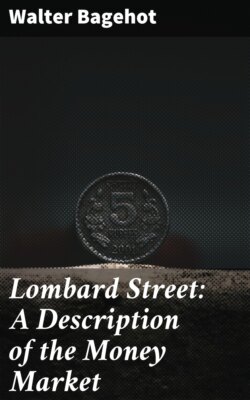Читать книгу Lombard Street: A Description of the Money Market - Walter Bagehot - Страница 5
На сайте Литреса книга снята с продажи.
I.
ОглавлениеThe objects which you see in Lombard Street, and in that money world which is grouped about it, are the Bank of England, the Private Banks, the Joint Stock Banks, and the bill brokers. But before describing each of these separately we must look at what all have in common, and at the relation of each to the others.
The distinctive function of the banker, says Ricardo, 'begins as soon as he uses the money of others;' as long as he uses his own money he is only a capitalist. Accordingly all the banks in Lombard Street (and bill brokers are for this purpose only a kind of bankers) hold much money belonging to other people on running account and on deposit. In continental language, Lombard Street is an organization of credit, and we are to see if it is a good or bad organization in its kind, or if, as is most likely, it turn out to be mixed, what are its merits and what are its defects?
The main point on which one system of credit differs from another is 'soundness.' Credit means that a certain confidence is given, and a certain trust reposed. Is that trust justified? and is that confidence wise? These are the cardinal questions. To put it more simply—credit is a set of promises to pay; will those promises be kept? Especially in banking, where the 'liabilities,' or promises to pay, are so large, and the time at which to pay them, if exacted, is so short, an instant capacity to meet engagements is the cardinal excellence.
All which a banker wants to pay his creditors is a sufficient supply of the legal tender of the country, no matter what that legal tender may be. Different countries differ in their laws of legal tender, but for the primary purposes of banking these systems are not material. A good system of currency will benefit the country, and a bad system will hurt it. Indirectly, bankers will be benefited or injured with the country in which they live; but practically, and for the purposes of their daily life, they have no need to think, and never do think, on theories of currency. They look at the matter simply. They say 'I am under an obligation to pay such and such sums of legal currency; how much have I in my till, or have I at once under my command, of that currency?' In America, for example, it is quite enough for a banker to hold 'greenbacks,' though the value of these changes as the Government chooses to enlarge or contract the issue. But a practical New York banker has no need to think of the goodness or badness of this system at all; he need only keep enough 'greenbacks' to pay all probable demands, and then he is fairly safe from the risk of failure.
By the law of England the legal tenders are gold and silver coin (the last for small amounts only), and Bank of England notes. But the number of our attainable bank notes is not, like American 'greenbacks,' dependent on the will of the State; it is limited by the provisions of the Act of 1844. That Act separates the Bank of England into two halves. The Issue Department only issues notes, and can only issue 15,000,000 L. on Government securities; for all the rest it must have bullion deposited. Take, for example an account, which may be considered an average specimen of those of the last few years—that for the last week of 1869:
An account pursuant to the Act 7th and 8th Victoria, cap. 32, for the week ending on Wednesday, the 29th day of December, 1869.
